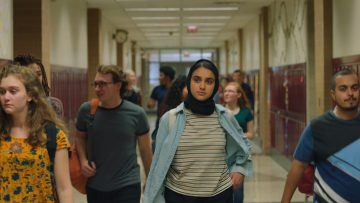Hannah Giorgis in The Atlantic:
 Hala, the new film from the writer-director Minhal Baig, is a study in contrasts. The coming-of-age story follows its titular protagonist, a Pakistani American teenager played by Geraldine Viswanathan, as she navigates the confusion of adolescence in the United States. The divides she encounters are apparent almost immediately: parents versus classmates; Pakistan versus America; Islamic tenets versus romantic freedom. Hala skateboards to school and writes poetry. She also clashes with her strict mother and father, who chide her relentlessly for any number of activities her white friends speak about with casual disregard.
Hala, the new film from the writer-director Minhal Baig, is a study in contrasts. The coming-of-age story follows its titular protagonist, a Pakistani American teenager played by Geraldine Viswanathan, as she navigates the confusion of adolescence in the United States. The divides she encounters are apparent almost immediately: parents versus classmates; Pakistan versus America; Islamic tenets versus romantic freedom. Hala skateboards to school and writes poetry. She also clashes with her strict mother and father, who chide her relentlessly for any number of activities her white friends speak about with casual disregard.
Movies about teens fighting with their parents are nothing new. But in examining the binaries that 17-year-old Hala confronts, Baig’s film joins a growing group of films and TV shows centered on young Muslim characters in America. Like some prior productions, including Aziz Ansari’s Netflix series Master of None and Kumail Nanjiani’s romantic comedy The Big Sick, Hala has received criticism for featuring yet another protagonist who has a fraught relationship with Islam and who sees her white love interest as one key to self-actualization. Capturing an entire community’s relationship to their religion is a staggering mandate, one that’s impossible for any one production (or two or three) to achieve. As a result, Hala is sharpest when viewed on its own terms—that is, in the way many coming-of-age films about white teens are. The film stands out most for its deft character work with Hala and her parents, especially when it doesn’t treat the trio as case studies for sweeping ideas about Muslim identity.
More here.
